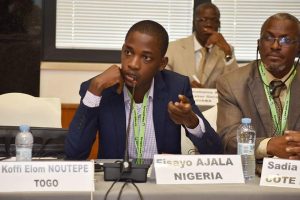Fisayo Ajala, SPACES FOR CHANGE’s / S4C’s Researcher on Civic Space joined 47 other civil society representatives and stakeholders from across the West African region at the three-day sensitization workshop organized by the Intergovernmental Action Group Against Money Laundering in West Africa (GIABA). The recently-concluded workshop on anti-money laundering (AML) and countering financing of terrorism (CFT) requirements for civil society organizations (CSOs) was held in Praia, Cabo Verde on 5-7 September 2018. The workshop is the sixth in the series after previous editions in Dakar (2012), Abidjan (2014), Lagos (2015), Cotonou (2016) and Banjul (2017).
GIABA is a specialized ECOWAS institution that is ‘‘responsible for strengthening the capacity of member states towards the prevention and control of money laundering and terrorist financing in the region’’. In a statement on its website, GIABA stated that the objectives of this 2018 workshop are to ‘sensitize CSOs on the dangers and consequences of money laundering and terrorist financing (ML/TF) in the region; build their capacity to understand and apply AML/CFT rules; and raise their awareness so that they can advocate for effective implementation of AML/CFT mechanisms at national and regional levels’.
The Praia workshop was not meant to be just another workshop, but one that stimulated interactions and debate among participants following the bespoke presentations and different in-session breaks over the course of the three days. The workshop facilitators, drawn from the civil society, academia and GIABA secretariat, delivered presentations on specific issues ranging from an overview of AML/CFT measures to the role, mandate and activities of GIABA in the sub-region. Particularly significant is the presentation detailing the place and role of civil society in the sensitization, advocacy and mobilization around AML and CFT issues, while underscoring the importance of networking and the adoption of appropriate approaches to deliver sectoral interventions and results. The major takeaway from this session is the imperative for CSOs working on AML/CFT issues to build and maintain healthy relationships with policy institutions statutorily charged with the mandate to implement AML/CFT regimes.
The observations shared by participants reflect the difficulties CSOs face in undertaking advocacy around AML and CFT issues in the sub-region. They include:
- The inefficiency of the judicial system, the inefficiency and deficiency of legislation and the lack of political will of the Member States constitute obstacles in the fight against ML/TF.
- CSOs face difficulty in having access to government information and data, in order to carry out facts-based advocacy.
- It is necessary to know the actions being carried out by GIABA in order to establish whether or not CSO funding is a means for ML.
- There is a great need for massive sensitization and awareness building among young people on the need to fight against ML/TF. However, only awareness and laws are not enough to deter young people in the region from committing such crimes; governments need to create employment conditions.
- The preponderance of cash-based economy in member States and high level of poverty pose ML/TF risk in the region.
- CSOs with low level awareness of predicate offences may be exploited into laundering funds for others.
Based on the observations, participants made the following recommendations;
That National Government/authorities should:
- increase the participation of CSOs in the fight against Money Laundering and Terrorist Financing (ML/TF)
- publicise the list of entities authorised to carry out money transfer services
- ensure the safety of the CSO and the media in carrying out their responsibilities
That National CSO Networks/Platforms should:
- organize dialogue sessions between political actors and CSOs for a concerted action.
- carry out studies to understand the reality of CSOs and, from there, outline strategies for action.
- strengthen and broaden the existing cooperation among them at both the national and regional levels
- ensure to document their interventions and keep proper accounting records
- build their capacities on all the twenty-one (21) predicate offences of money laundering in order to be adequately prepared to combat these crimes.
‘CSOs need to join existing AML/CFT networks at various national and regional levels to continue the advocacy and awareness on AML/CFT measures‘, GIABA urged. Mr. Kimelabalou ABA, GIABA’s Director General’s gave this admonition during the opening session which harped on the need for CSOs to collaborate with each other, with other national AML/CFT institutions, GIABA and other civil society organisations in fighting money laundering and terrorist financing within the non-profit sector.
The workshop ended with a communique, workshop evaluation and a tour of historical sites in the city. Participants left the workshop with greater knowledge of ML/FT regimes and predicate offences in the region, bolstering their capacities to increase their advocacy and awareness-creation in their respective countries. Armed with better information about the work of GIABA, the doors towards greater collaboration and coordination with the intergovernmental body, have now been opened even wider.





















